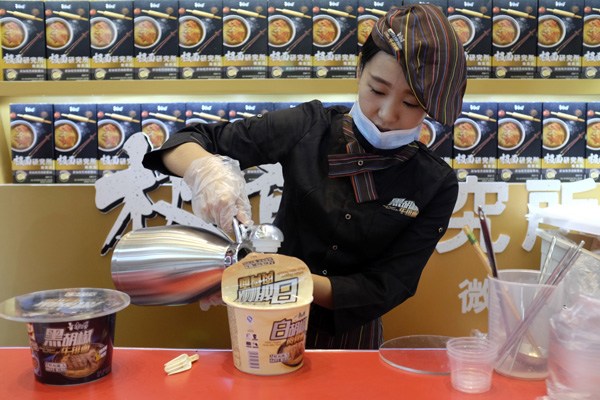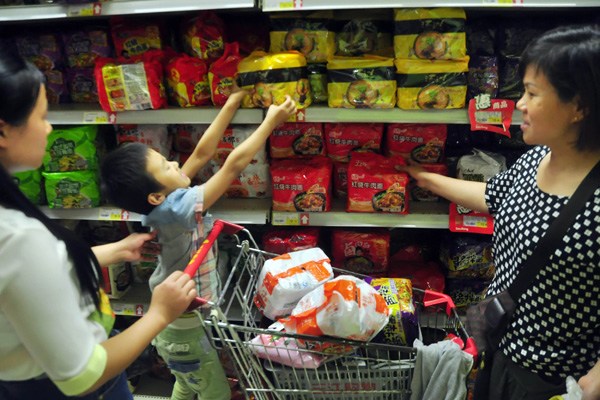
A salesperson prepares a bowl of instant noodles at a food fair in Beijing in September. (Photo by Dafei/For China Daily)
Emma Deng did something unusual on her recent Beijing-Shanghai five-hour high-speed train ride. Instead of snacking on a bowl of instant noodles, as was her wont, the frequent traveler unpacked lunch and beverages brought from KFC and Starbucks outlets at the Beijing South Railway Station.
"When you have choices of fresh food from restaurants, instant noodles become less attractive," she said.
Fast-food alternatives and health awareness have been dealing heavy blows to the instant noodles market in China, the world's largest.
Once the staple of train passengers and office staff working overtime, instant noodles are no longer having easy access to tummies in China.
According to the World Instant Noodles Association, consumption in the Chinese mainland and Hong Kong has declined from 42,470 million servings in 2011 to 40,430 million servings in 2015.
According to Mintel Group Ltd's report released in January, retail sales of instant noodles in China are estimated to have grown just 2.2 percent between 2010 and 2015, reaching 65.3 billion yuan ($9.7 billion) in 2015. Mintel expects a 1 percent drop in sales to 62.1 billion yuan by 2020.
Four noodle-makers-Tingyi Holdings, Uni-present, Baixiang and Jinmailang-command an 80 percent share of China's instant noodles market.
Leading brand MasterKong of Tingyi saw its net profit plunge nearly 65 percent year-on-year to $69.7 million in the first half of this year. Its second-quarter profit saw the sharpest drop in ten years, down nearly 14 percent year-on-year to $1.54 billion.
In the first six months of this year, instant noodles accounted for almost 37 percent of the group's revenue, 52 percent of market-wide sales and 43 percent of market share, according to Nielsen's statistics.

Zhao Ping, a researcher at the Institute of China Council for the Promotion of International Trade, attributed the decline in sales of instant noodles to changing tastes of Chinese consumers.
"Awareness of nutrition, health and safety in the context of food is up," said Zhao. "Alternatives to instant noodles are popular due to the rapid growth of Chinese chains that sell rice- or noodle-based fast food."
To survive the onslaught of new foods and dispel the image of junk food, instant noodles need improved nutrition quotient and better ingredients like dry fruits and vegetables, she said.
According to a December 2015 Mintel report, instant noodles are generally regarded as an unhealthy snack in Asia, despite their popularity in the region. The continent accounts for 86 percent of global sales, according to the WINA.
Not surprisingly, China saw a significant decline in sales. Per capita consumption is 2.6 kilograms, much lower than 8.7 kg in South Korea.
In response, both MasterKong and Uni-present have launched new instant noodle products that are positioned as healthy and premium snacks.
MasterKong has upgraded its Classic series that was priced 4 yuan to a high-end product priced 4.5 yuan per pack. This has helped bring about a recovery in its June revenue. The new product includes a concentrate of soup that enhances both taste and nutritional value, according to the company's half-yearly financial report.
Other developments in the market include the end to Nissin's collaboration with Jinmailang as the former aims to invest more in the premium segment. This, in turn, may have prompted Jinmailang to shift its focus to the mass market.


















































